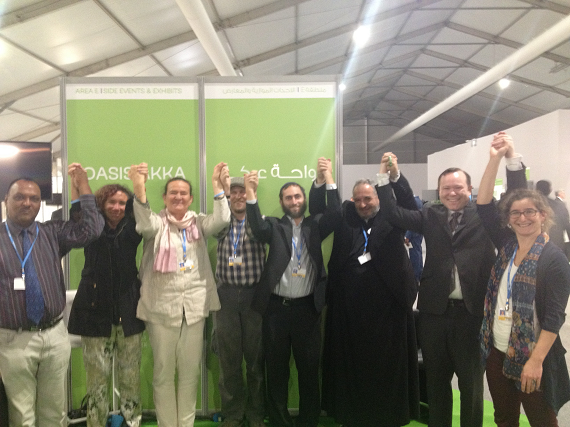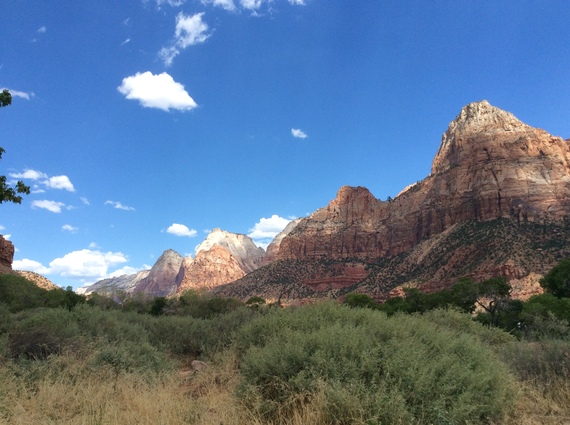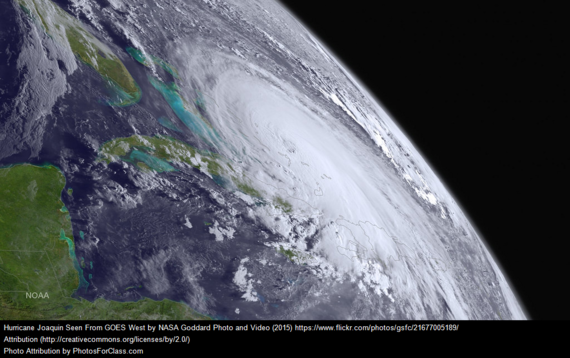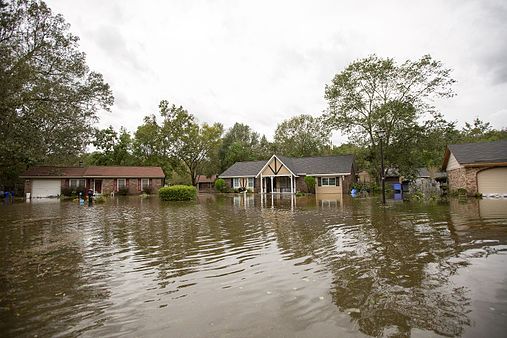What this election reveals to me is to the extent to which American society, but more generally the dominant paradigm of consumer society, is on a collision course with Creation. Since being elected, Mr. Trump is prioritizing creating jobs, growing businesses, drilling oil and gas, mining coal, and expanding infrastructure, including highways and oil pipelines. The broader societal goal is to expand material consumption and consumer society. It therefore makes sense for him to say that we should roll back the EPA's environment protection's and the UN's climate change accord, because both of these may limit the unrestrained growth of material and consumer society, especially one fueled by fossil fuels. The election is helpful is clarifying that we are heading full steam ahead for the iceberg.
I attended the recent UN climate change conference in Marrakesh, Morocco, as well as the Fez Climate Conscience Summit. Both included religious figures from many of the world's faiths, from Marrakesh to Bangladesh. Dozens of religious and lay leaders all agreed that the global ecological crisis is not just a scientific or a political problem--it is also a religious and spiritual challenge. We must act on climate change to leave our children a livable planet. Worldwide interfaith leadership and cooperation provided hope for spurring climate action. Priests, imams, rabbis, and monks joined hands in Morocco near where about 500 years ago European Christians and Moroccan Muslims fought one of the epic battles of pre-modern times.
An ocean away, the majority of religiously observant American Christians elected a president who opposes any action to address climate change. The election results were a bitter pill to swallow for many of the climate delegates hailing from Bangladesh to Marrakesh. According to exit poll surveys conducted by the New York Times, Donald Trump received the support of 81% of white Evangelicals, 52% of Catholic voters (and higher among white Catholics), 58% of Protestants or other Christians, and 56% of those who attend religious services once a week. Millions of faith adherents support political leaders who deny climate change, but often without informed input from their religious leadership.
Donald Trump has called climate change "a hoax" and following his election, appointed Scott Pruitt to lead the EPA. Pruitt is a passionate climate denier and close ally of the fossil fuel industry who will most likely, as his track record suggests, dismantle the climate policies set forth by the Obama administration.
As Stanford professor Dr. Robert Proctor points out in his op-ed, Climate Change in Trump's Age of Ignorance, "Judging purely from his transition team, Mr. Trump's administration could be more hostile to modern science--and especially earth and environmental sciences--than any we have ever had."
The United States is the world's second biggest emitter behind China. It accounts for 16 percent of cumulative global greenhouse gas emissions. Therefore, President-elect Trump and the Republican-controlled Congress have a significant influence in regards to climate policy, and also on how seriously other countries work to address climate change.
Last year, in his Encyclical Laudato Si', On Care for Our Common Home, Pope Francis wrote, "Superficially, apart from a few obvious signs of pollution and deterioration, things do not look that serious, and the planet could continue as it is for some time. Such evasiveness serves as a licence to carrying on with our present lifestyles and models of production and consumption... Still, we can see signs that things are now reaching a breaking point, due to the rapid pace of change and degradation... The earth, our home, is beginning to look more and more like an immense pile of filth." (Paragraphs 59, 61, and 21)
While Pope Francis is the spiritual leader of Catholics and not Protestants or evangelicals, this election has shown us that, for most religious American voters, care for our common home is not a significant enough issue to sway their vote. The question that must be asked is: Why?
A 2014 survey by the Public Religion Research Institute and the American Academy of Religion sheds some light. It found that "most Americans who attend religious services at least once or twice a month hear little from their clergy leaders about the issue of climate change. Just over one-third of Americans say their clergy leaders speak about climate change often (11%) or sometimes (25%). More than 6-in-10 Americans say their clergy leaders rarely (29%) or never (33%) reference climate change."
In the reverse, the survey also found a correlation between clergy speaking about climate change and the number of congregants who believe that climate change is occurring and human caused. "Americans who say their clergy leaders speak at least occasionally about climate change are more likely to be climate change believers than Americans who tend not to hear about climate change in church."
According to a recent poll by Yale and George Mason universities, the vast majority of Americans do not view climate change as a moral or religious issue. One sees that the low incidence of American clergy teaching on climate change, and by extension, environmental issues in general, is reflected in how American citizens view the issue of climate change.
The fact that nearly every eight years a president of the United States is elected who implements policies that show that he has no awareness of environmental issues, reflects a broader trend within American society. The fact that recent governments in Canada, Australia and South Africa have been led by climate deniers or those who oppose action to address climate change reveals an underlying issue present in many countries. The problem is not climate change- the problem is excessive materialism, a mentality that we can do whatever we want on this planet, and that there are no consequences for our actions. To quote Dr. Proctor, "The global climate catastrophe gets short shrift, largely because powerful fossil fuel producers still have enormous political clout, following decades-long campaigns to sow doubt about whether anthropogenic (human-caused) emissions are really causing climate change." 98% of climate scientists writing in peer reviewed journals say they are.
What is particularly striking is that the 2016 election was decided in Trump's favor by victims of climate change. Four weeks before the election, Hurricane Matthew battered the Southeastern U.S., killing 28 people while causing over 1 million homes and businesses to lose power, and damaging billions of dollars of property. The hardest hit states were North Carolina and Florida. In North Carolina, thousands of people were stranded in high water, and 1.4 million people required assistance. In Florida and North Carolina, even people who were directly impacted by an extreme weather event exacerbated by climate change still voted for a candidate who will oppose action to address its causes. And those two states decided the election-- by a thin margin in Florida.
Scientists say that that is likely only the beginning. A group of eighteen scientists, including the leading climatologist Dr. James Hansen, released a report that the current rate of global warming may melt the ice caps and rise sea levels to such an extent that by the time I am old hundreds of millions of people will need to flee their homes, threatening the ability of human society to continue. The question I find myself asking myself is, how can a person survive a climate-change-exacerbated flood and then, only a few weeks later, vote for a candidate who denies there is such a thing as climate change?
To be fair, Hillary Clinton's embrace of fracking for gas, and her running mate Kaine's embrace of offshore oil drilling, indicate that their approach to curbing climate change would likely not lead to the level of change required in order to avert catastrophic global heating. As Climate Analytics notes, "We need to consume 12-14 gigatonnes of emissions less than what we currently do, or 25% less, to stay on course with the 1.5 degree celcius limit by 2030. Limiting to below 1.5 degrees by 2100 requires reduction by 70-95%. Greenhouse emissions need to be zero by 2060/2080 (at the current rate)." As 350.org points out, this "new math on climate change shows that every new fossil fuel project -- every coal mine, every gas well, every oil pipeline-- violates the goals laid out in the Paris climate accord." Both Democratic and Republican climate policies are not likely to enable humanity to stay below the 1.5 celcius rise in global temperatures needed in order to avert catastrophic climate change.
The ascendance of a president intent on "drill baby drill" signals that the paradigm of those who support continued exploration and exploitation of fossil fuels is still very strong. That should be little surprise, because some of the largest companies in the world today are fossil fuel companies and the industrial lifestyle of billions of people is powered by this energy source.
There are deeper issue that needs to be addressed that have little nothing to do with who is President-- after all he or she is just a reflection of the current society. To address these deeper issues-- moderating consumption, thinking long-term, and caring for other people and species-- we need faith leaders and communities to get fully on board in addressing the ecological and spiritual crisis.




